



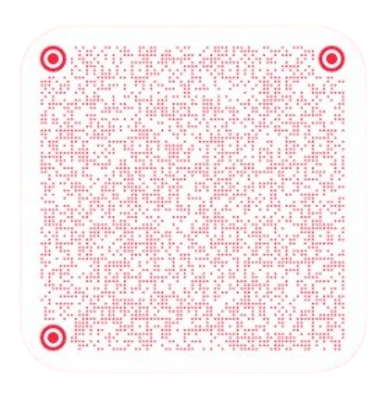
As August begins, students nationwide are enjoying their summer vacation. In a small county of Qinghai Province, people don't even need to seek relief from the summer heat.
There is no scorching heat in Yushu Zaduo County, Qinghai, and it remains geographically and culturally distant from the fast-paced life and cutting-edge technology of modern cities. In April 2024, Luo Songqiujia, an elementary school teacher from the region, joined an educational delegation organized by the Zaduo County Education Bureau for a training program in Beijing. At an educational technology event, he encountered the concept of artificial intelligence—a term he had never heard before.
This year marks Luo Songqiujia's eighth year as a Chinese teacher at Duona Hope Primary School in Zaduo County. This tall, thin young Tibetan man, with his neatly trimmed buzz cut, always breaks into a smile after speaking a few words. Among all the teachers at the school, he's known for being the most enthusiastic about embracing new experiences.
This small county, located 1,000 kilometers away from Xining, sits at an average altitude of over 4,200 meters. It has more than ten elementary and middle schools, yet scarcely any teachers have heard of artificial intelligence or AI.
Duona Hope Elementary School has over 200 students, but their learning progress is quite slow. It can take one or two weeks to teach a single ancient poem. For someone like Luo Songqiu, who teaches there, it's hard to imagine how educators in big cities utilize technology to enhance children's learning.
To Luo Songqiujia's surprise, just three months later, an AI-powered Xueersi Xpad appeared before him. Now, he could access the same advanced learning methods used by children in Beijing - the one he had once only dreamed of.
Class at 4,000-Meter Altitude Requires Shouting
Yushu's Zaduo County is renowned as "premier cordyceps hub." Locals proudly claim: "Qinghai sets the standard for China in cordyceps production, Yushu leads Qinghai, and Zaduo County represents the pinnacle of Yushu's cordyceps."
From late May to late June every year, schools close and work stops. Families pack their cars with tents and camping supplies, heading to the mountains. There, they spend a month working together to reap the harvest .
This summer vacation here is replaced by the unique "caterpillar fungus holiday." In the off-season for fungus harvesting, herders primarily tend their yaks on mountain grasslands. They stay in winter grazing camps during colder months, then move the herds to summer pastures when the weather warms.
The high-altitude grasslands and county towns are often hundreds of kilometers apart, with herders returning only weekly or even less frequently.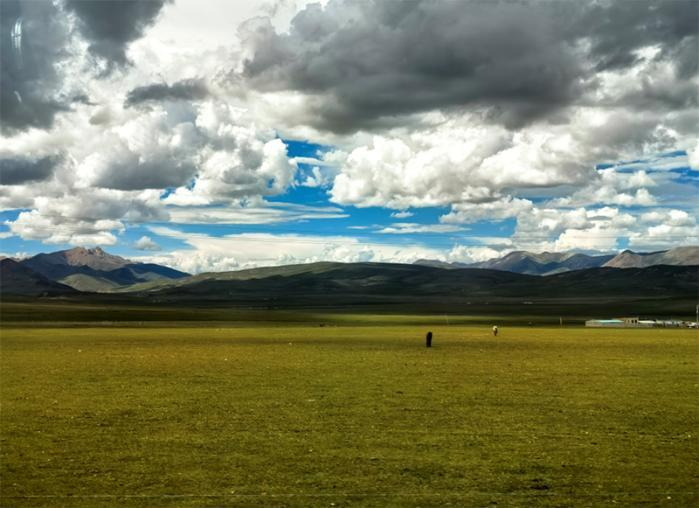
A variety of plateau grasslands
Under such a special lifestyle, the children's family education environment is relatively weak. As a result, The teachers in the school have to take on more responsibilities - they need to provide not only academic education but also more care and companionship for these children.
"The parents entrust their children to the school, and we cannot fail in educating them," said Gamacaring, who has the most resonance. "But the children here are wild and loud - even shouting can't get over them." In the leisurely and stable pace of life on the plateau, ta teacher might be one of the hardest-working professions in the local area. These dedicated, conscientious teachers strive to properly educate the children and be worthy of their parents' trust.
Gamacaring, 38, is the principal of the Second National Elementary School in Zaduo County. A square-faced, well-built man from Hanzhong, he joked that his weathered appearance makes him look older than his age. "It's always windy and sunny here, my skin can't compare with the people in the city.
The Second National Elementary School in Zaduo County is the largest single elementary school in the region. It enrolls over 3,700 students, and one-third of the students in the county study there. There are more than 40 classes in the school, and over 60 classes at the peak, The school typically operates more than 40 classes, expanding to over 60 at peak capacity, with three large teaching buildings.
On the other hand, in a classroom, dozens of lively and mischievous children often give teachers headaches. The thin air on the plateau makes teaching particularly challenging. One teacher even fainted on the podium after speaking loudly for three or four consecutive classes.
The teachers' families don't live in Zaduo but in other areas of Qinghai. They can only go back home every few months or even just once a semester, traveling hundreds to thousands of kilometers each way.
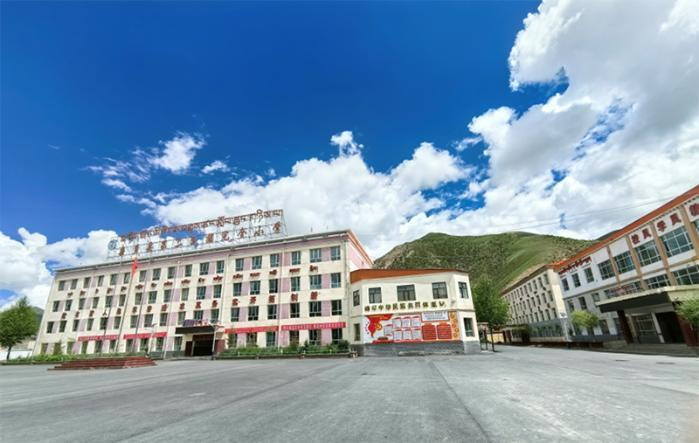
Zaduo County Second Ethnic Complete Primary School
Teachers Not Familiar with AI
In June, the leaders of Zaduo County's Education Bureau informed Principal Gamacai that a batch of Xueersi Xpad would be delivered to mountain schools, and the Second National Elementary School in Zaduo County would receive a portion. Although Gamacai didn't fully grasp the hardware products and functions explained by the officials, his immediate thought was to put them to use effectively, ensuring these tools could support the teachers' work as soon as possible.
Luo Songqiujia had also heard about the Xueersi Xpad from Duona Hope Primary School, but he didn’t associate it with the rise of artificial intelligence or advanced technology. He didn’t even know what the machine looked like.
His colleagues thought the Xueersi Xpad would be a thick paper book connected to a reading pen , which could automatically produce sounds and read the text aloud. They assumed it was some kind of reading machine. But Luo Songqiu Jia believed a learning machine was actually a computer with a screen and keyboard, capable of typing, preparing lessons, and perhaps even programming. He'd heard it could also correct homework, though he couldn't understand how the machine do that.
On July 14th, a batch of Xueersi Xpad was delivered to Zaduo County. Duona Hope Primary School, the Second National Elementary School, and several other local schools received the learning machines.
When Luo Songqiu Jia first saw the tablet learning device—so different from what he had imagined—he hesitated to use it, as it seemed too advanced. Yet as he gradually explored its features, he unintentionally finished an entire lesson.
On July 16th, teachers from the Xueersi Public Welfare Team visited Duona Hope Primary School and conducted a training session on using learning machine for all the teachers.
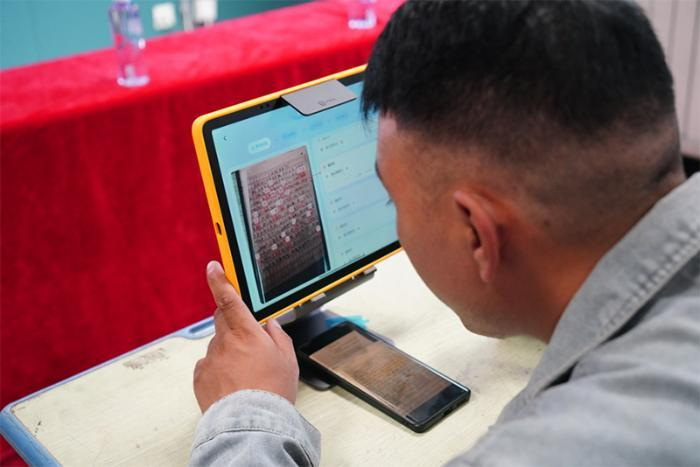 Teachers from Duona Hope Primary School experiencing theXueersi Xpad essay correction function
Teachers from Duona Hope Primary School experiencing theXueersi Xpad essay correction function
When a roughly scribbled essay was presented to the "Smart Eye" of the learning machine, the teachers clicked to take a picture. Immediately, the learning machine automatically circled misspelled words, flagged incorrect sentences, and highlighted good phrases in the article. In the classroom, all the teachers whispered, "Wow."
When they continued to experience the Xueersi Xpad , it would review and improve each paragraph, evaluate the entire document, and finally provide structural suggestions with "one-click refinement" capability for the entire document. This entire process was completed in a few seconds, made possible by Xueersi's deep integration of educational research experience with the powerful generative capabilities of 2023's large AI models, bringing advanced AI functionality to the Xueersi Xpad.
Luo Songqiujia said that correcting essays is now the most time-consuming part of his work. When a child's Chinese foundation is weak, each essay requires checking for misspelled words, grammatical errors, and suggestions for improvement, along with comments. It takes at least ten minutes to correct an essay, and it is easy to overlook some mistakes. It takes several hours to correct all the children's essays.
For younger students at Duona Hope Primary School, teachers also teach them to dress and make their beds, occasionally help with washing their hair and feet. For the fifth and sixth graders, teachers schedule laundry sessions during evenings or weekends.
"There are plenty of daily chores, and if I can save a lot of time on correcting homework, it will be a big help," Luo Songqiujia said.
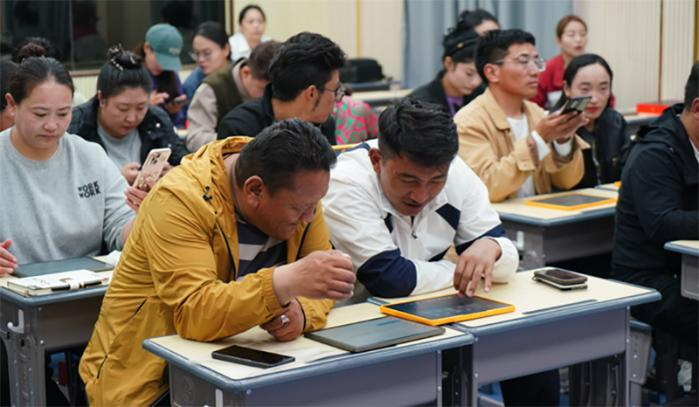
Teachers assessing the use of the learning machine
XiaoSi XiaoSi,"I'm here."
Xiao Ni, another Chinese teacher at Duona Hope Primary School, likes the dialogue feature of the learning machine most.
She recalled a dilemma she once faced while teaching Lesson 13 'The Flower Clock' from the third-grade Chinese textbook:
'At four in the morning, morning glories sound their purple trumpets; around five o'clock, gorgeous roses burst into bloom; at seven, water lilies wake from their dreams...'
"Where can you see morning glories?", "How do water lilies sleep?", "Why does the moonlight flower only bloom at night?"... The naive questions from the children left Xiao Ni stumped.
After teaching Chinese for 12 years, she has taught students from grades one through six. Xiao Ni constantly faces various questions from her pupils. For example: What is the historical background of "Never forget the digger when you drink from the well"? Why are there spectacular tides described in "Watching the Tide", while the Lancang River - which originates in Yushu - doesn't have such tidal phenomena?
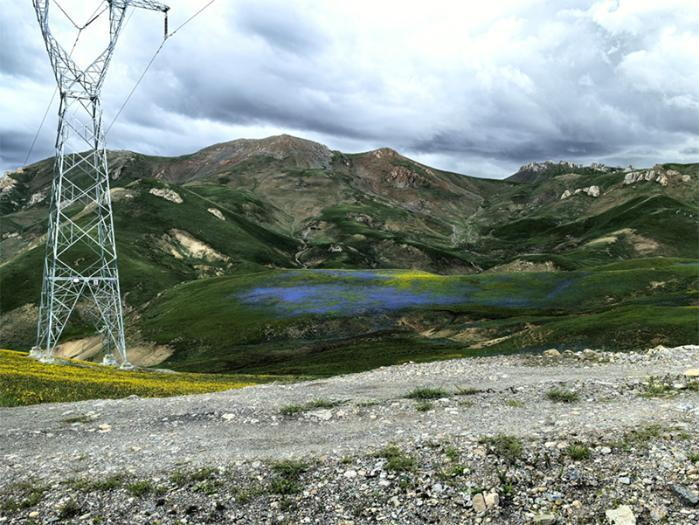
The diverse plateau scenery
The children of Zaduo County grow up in the wild mountains and grasslands. After school, they chase each other through the hills and play by the streams. Their understanding of the world, aside from the plants and trees in their small town, comes almost entirely from the classroom.
Whenever they encounter things beyond their daily lives, the questions pour out one after another—often leaving even their teachers at a loss for answers.
Teacher Xiao Ni remembered that on the day the training Xueersi Xpad were first used, one teacher tried calling out, "Xiao Si, Xiao Si," and the dozen or so devices in the classroom responded one after another with "I'm here," "I'm here..." like a continuous echo, making all the teachers burst into laughter. Later, the Chinese, math, and English teachers each asked Xiao Si academic questions, and it was able to answer them all one by one.
Even life and personal struggles could be shared with Xiao Si. Teacher Xiao Ni thought to herself that after class, she could leave the learning machine on the podium so the children could ask it all kinds of questions.
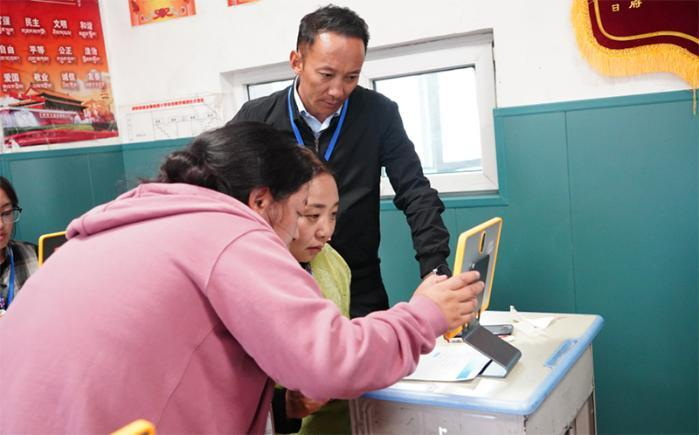
The teacher at Duona Hope Primary School trying out the Xueersi Xpad.
A local school principal remarked, "It's like hiring a seasoned teacher for the school!"
English teachers use it to guide students in reading textbooks and looking up words. If they lack confidence in their pronunciation, they can directly connect to the Xueersi Xpad and project the screen to read the text aloud.
Math teachers say they prepare for class by watching the videos first, then teaching the students following the video's approach—essentially improving their lesson planning. Features like oral calculation grading and targeted math learning are also highly practical.
"Hand in Hand" Expand to 100 Rural Schools
Schools like Zaduo Hope Primary School and the Second Ethnic Minority Complete Primary School are among the nearly 100 schools that Xueersi's public welfare team plans to support this year. This initiative is part of the "Hand in Hand" public welfare campaign launched this year, which aims to provide the Xueersi Xpad to teachers in 100 schools within three years. Previously, the program has already been implemented at Changkeng Primary School in Jinyun, Zhejiang, and Erlangshan Primary School in Luding, Sichuan.
Wei Chen, Executive President of TAL Education Group, stated that the Xueersi Xpad "Hand in Hand" initiative is designed to help teachers improve classroom efficiency. The hope is that by utilizing the content resources and AI features on the Xueersi Xpad, teachers can provide students with a unique learning experience.
Xueersi has built over 12 million minutes of course resources into its learning tablets, covering in-school and extracurricular content in Chinese, math, and English from preschool through high school. The head of Xueersi's public welfare team explained that how to leverage technology to support everyone's growth has been a constant focus for them. Since these resources are already integrated into the learning tablets, making them accessible to students who wouldn't normally have such opportunities would create even greater value.
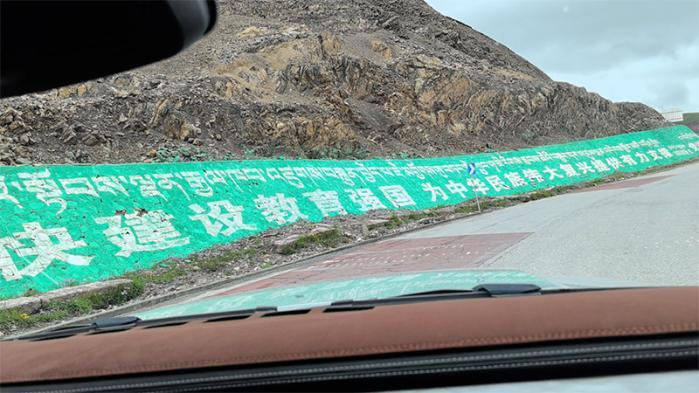
The slogan by the mountain road in Dona County
On the winding mountain road from Yushu Airport to Zaduo County, where the altitude reaches over 4,700 meters, a bold slogan is written across the mountainside: "Accelerate the building of a strong education system to provide robust support for the great rejuvenation of the Chinese nation."
The teachers from Xueersi's charity program say they haven't thought that far ahead—they just want to make the local teachers' work a little easier and meet the children's needs a little better. They believe that if these small steps are taken, everything will surely improve.
China News Network, the original title: AI on the plateau.
https://m.chinanews.com/wap/detail/chs/zw/10263838.shtml